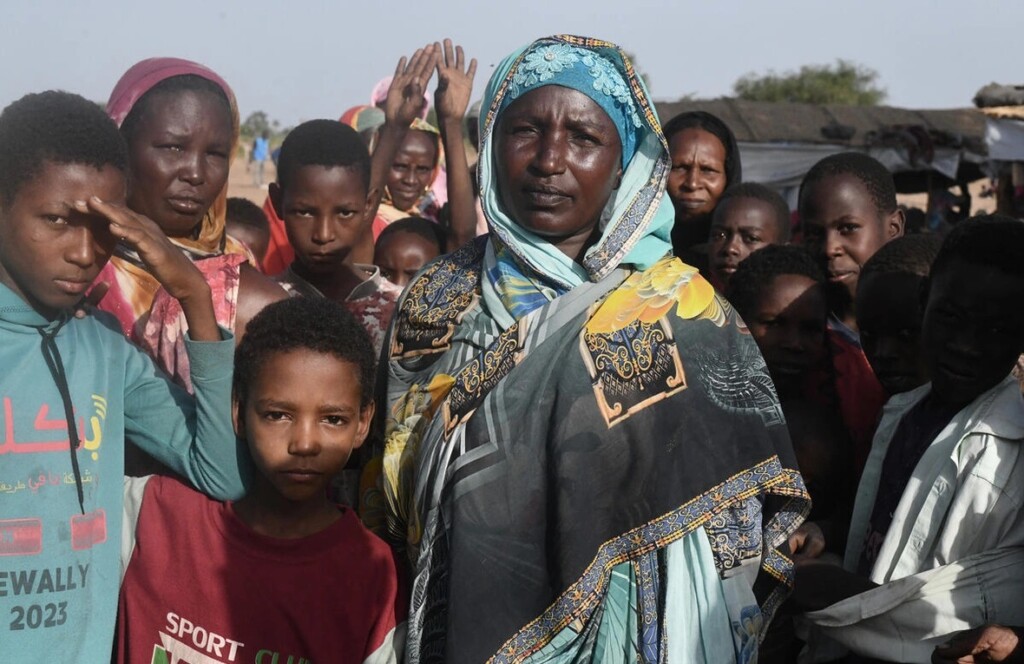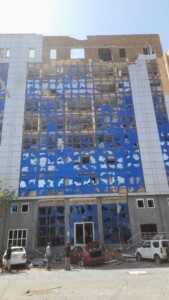Jeddah negotiations failure a ‘painful blow’ to Sudanese people

Sudanese refugees wait to be registered after crossing the border into the Central African Republic (Photo: Xavier Bourgois / UNHCR)
Frustration prevailed amongst political actors and pundits after it was announced that negotiators in the Saudi Arabian city of Jeddah failed to reach an agreement to end the war that erupted between the Sudan Armed Forces (SAF) and its paramilitary counterpart the Rapid Support Forces (RSF) on April 15.
Hopes among the Sudanese were high for the Saudi-US mediation to reach a peaceful solution that prevents the war from spreading to new parts of the country, threatening the unity and integrity of the Sudanese nation, have been crushed by the news about the suspension of the latest round.
Some commentators expected that the two sides would at least reach a temporary ceasefire that would open safe humanitarian corridors, allow millions of displaced people to return home, and allow international organisations to enter to distribute relief aid to millions who are on the brink of starvation in the Sudanese capital and the states.
It is not yet known when, or if, the two sides will return to negotiations at the Jeddah platform. “We must not deceive the people, as the Jeddah negotiations do not make any progress due to the lack of political will, and today’s speech is talk of war, not peace,” said Yassir Arman, spokesperson for the Forces for Freedom and Change (FFC), on Sunday.
Amid fears that battles between the army and the RSF would escalate, the Horn of Africa Intergovernmental Authority on Development (IGAD) heads of state scheduled an emergency summit on December 9 in Djibouti to discuss the war in Sudan. This was agreed after a meeting on Thursday between Djiboutian Foreign Minister Mahmoud Youssef and the Executive Secretary of IGAD, Warkini Kabihou.
A painful blow
The collapse of the negotiations “means a painful blow to the dreams of millions of Sudanese who were and are still waiting for a ceasefire, to return to their homes and start their lives again from scratch,” Mohamed El Faki, member of the Sovereignty Council between 2019 and 2021, and leading member of the Forces for Freedom and Change-Central Council, told Radio Dabanga yesterday.
“The war has destroyed the lives of millions of Sudanese, displaced more than seven million Sudanese, and of course collapsed economic, social, and health institutions, setting Sudan back centuries.”
According to El Faki, “what is required of all of us as political and civil actors and stakeholders in peace is to pressure the two parties by all available means to return to negotiations.”
He advised “rapid action” by the currently largest civilian bloc in the country, Tagaddum, “under whose roof many political parties, trade unions, civil society groups, resistance committees, and rebel movements sit.” The leading members of Tagaddum “should befriend regional and international actors, and the mediators of the conflict, to put pressure on the two parties to return to the negotiating table, because any delay means more losses.”
More than two parties
Ihsan Abdelaziz, member of the Sudan People’s Liberation Movement-Revolutionary Movement and FFC-CC leader, told Radio Dabanga that the war is no longer between two parties.
“Groups of armed men, called militias, back the RSF, while the SAF is supported by the shadow brigades such as the Baraa Ibn Malik Brigade and members of the dissolved Popular Defence Forces militia,” she explained to Radio Dabanga yesterday. “Each side seeks to strengthen its position on the ground. The RSF has gained control over more areas, which is also what the army is trying to do, despite its repeated and well-known defeats.”
She further claimed that the SAF General Command is controlled by elements of the former Al Bashir regime “who seek to continue the war to ensure their presence in the centres of power, while the Sudanese people alone pay the price of this cursed war.”
She explained that neither side cares for the well-being of Sudanese people, and “all this is happening in the absence of the necessary regional and international pressure to stop the war.”
Suspended only
Journalist Ammar Awad El Shareef expressed a more optimistic position, saying that the Jeddah talks did not fail, but were suspended. “The sources we spoke to indicate progress between the two parties,” he said.
“I believe that hope is pinned on the IGAD summit in Djibouti. Involved parties will develop a framework for a solution, which will make the Jeddah negotiations go more smoothly, once they restart,” he told Radio Dabanga.
The role of IGAD will be pivotal, according to El Shareef, because it is an international institution, and “any entry of international monitoring forces needs agreement from an African organisation, within the framework of African solutions to African issues.”
On November 29, the Democratic Civil Forces alliance, known as Tagaddum [progress], coordinating office approved a draft roadmap which proposes a comprehensive ceasefire, integrated with effective monitoring mechanisms, to support the Jeddah platform’s ongoing efforts in achieving a cessation of hostilities.
Confidence-building
Mousa Khaddam, advisor to the Commander of the RSF, Mohamed ‘Hemedti’ Dagalo, accused the army of not complying with any of the four confidence-building measures that were proposed, including the release of fugitives from prisons, stopping media propaganda escalation, allowing the safe passage of humanitarian aid, and adhering to the Jeddah platform principles. “The lack of commitment was clearly shown in the recent speeches of leading generals of the SAF,” Khaddam said yesterday.
He told Radio Dabanga that the RSF is committed to negotiations and that the priority of the next phase is to stop hostilities, stressing that they will not enter negotiations again unless confidence-building measures are implemented, accusing the army of not adhering to what is agreed upon, and this was clearly shown in previous truces agreements.
He considered that the start of political dialogue will not be possible unless hostilities cease, and the ceasefire is adhered to. The advisor further said that the SAF suffers from various divisions.
On the possibility of escalating military battles in the coming days, Khaddam described the situation as “foggy.” He added that “the battles have not stopped in the first place and that they will continue unless a clear cessation of hostilities and shooting is reached, especially since the SAF aircraft are still bombing.”
Fighting between the SAF and RSF continued over the weekend. Renewed clashes were reported from the vicinity of the Signal Corps in Khartoum North (Khartoum Bahri).
In Jebel Aulia, the southernmost point of Khartoum, thousands of people continue to flee towards White Nile state, local sources reported on Thursday. The RSF claimed its control of the entire Jebel Aulia military base on November 27.











 and then
and then